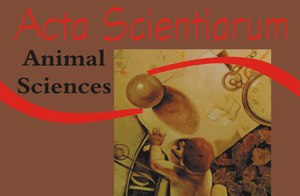ABSTRACT.
The objective of this study was to evaluate the increasing levels (0, 0.1, 0.2, 0.3, 0.4, 0.5 and 0.6%) of black pepper in diets for laying hens on performance, egg quality and blood biochemical parameters. Hissex White hens (n=168) at 30 weeks of age were used. The experimental method was completely randomized with seven treatments with four replicates of six birds each. Estimates of black pepper levels were determined by polynomial regression. The performance showed no significant differences (p > 0.05). The eggshell percentage was significantly influenced (p < 0.05), in which the level of 0.30% inclusion impaired eggshell quality. Triglycerides level increased significantly (p < 0.05), according to increasing levels of black pepper in the diet. It can be concluded that black pepper can be used in diets for laying hens as phytogenic additive without harming the performance. However, this inclusion causes a reduction in eggshell percentage and an increase in the level of triglycerides in the bloodstream.
Keywords:
alternative food; eggshell; phytogenic; piperine; serum metabolism




